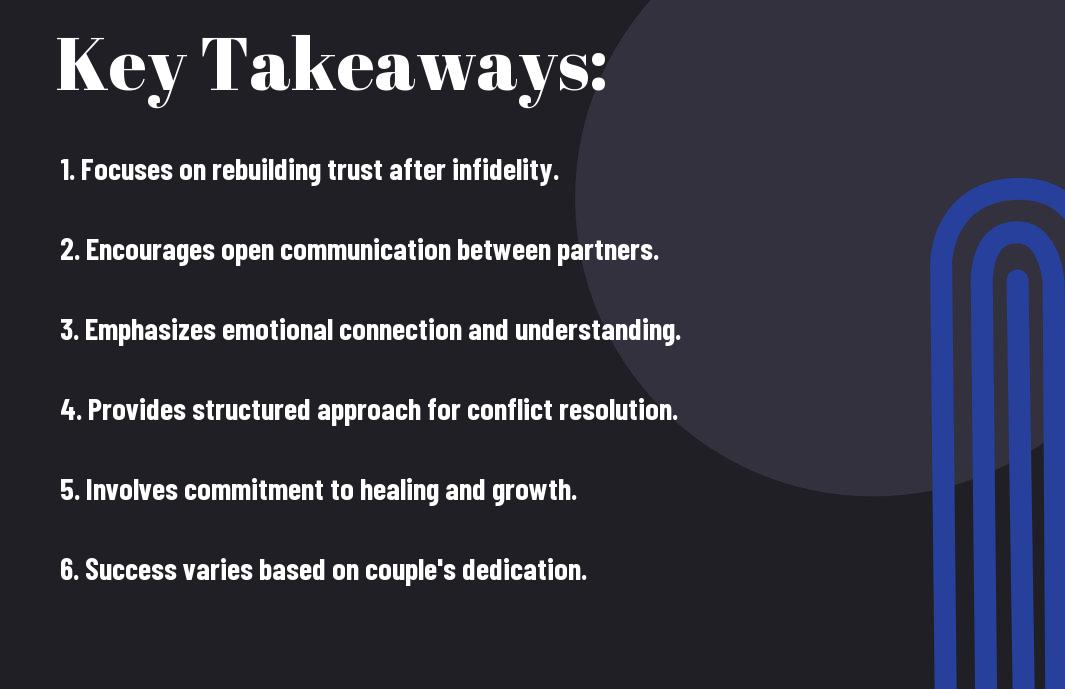With the emotional turmoil that follows infidelity, you may be seeking effective strategies to rebuild trust and heal your relationship. The Gottman Method offers a structured approach to affair recovery, focusing on enhancing communication, fostering intimacy, and resolving conflicts. This method emphasizes understanding your partner’s perspective while addressing underlying issues that may have contributed to the affair. By implementing its techniques, you can create a safe space for honest dialogue and rebuild your connection, helping you both navigate the challenging journey of recovery together.

Key Takeaways:
- The Gottman Method emphasizes understanding the underlying issues that led to the affair, promoting a path toward healing.
- Communication skills are a core focus, helping couples express their feelings and needs in a constructive manner.
- The method encourages rebuilding trust through transparency and accountability from the partner who had the affair.
- Emotional attunement is imperative, allowing both partners to connect on a deeper emotional level after the crisis.
- Each partner’s perspective is validated, which can help in fostering empathy and understanding of each other’s experiences.
- Working with trained therapists who specialize in the Gottman Method can enhance the effectiveness of the recovery process.
- Long-term dedication and effort from both partners are vital for the relationship to heal and thrive post-affair.

Understanding the Gottman Method
While every relationship is unique, the Gottman Method provides a scientific approach to understanding and improving your bond. Developed by Dr. John Gottman, this method is grounded in extensive research on couples and what makes relationships thrive or falter. By identifying your relationship dynamics and employing practical strategies, you can work towards healing and strengthening your connection in the wake of challenges like infidelity.
Overview of the Gottman Method
One of the most recognized frameworks for relationship building and repair, the Gottman Method emphasizes the importance of emotional intelligence and communication. It involves a comprehensive assessment of your relationship patterns, followed by specific interventions that you can implement together. This method fosters a deep understanding of your partner’s needs while strengthening your emotional bond.
Key Principles for Relationship Repair
To effectively repair the relationship after betrayal, the Gottman Method relies on several key principles that encourage healing and growth. These principles involve cultivating trust, enhancing emotional connection, and promoting open communication. By focusing on these aspects, you can pave the way toward rebuilding a stronger foundation.
Understanding how to apply the key principles for relationship repair is necessary for your healing journey. Focus on enhancing emotional connections by engaging in meaningful conversations and shared experiences, which can create a sense of safety and intimacy. Promoting open communication means being honest about feelings and expectations, allowing both you and your partner to express your emotions effectively. By fostering an atmosphere of support and trust, you are more likely to navigate the complexities of your relationship post-affair and create a pathway towards lasting recovery.
The Impact of Infidelity on Relationships
If you are navigating the turbulent waters of infidelity, you likely feel overwhelmed by the myriad of emotions and challenges that arise. The betrayal of trust can deeply wound relationships, often leading couples to question their commitment, connection, and future together. Understanding how infidelity affects your relationship is important for rebuilding and recovering from this painful experience.
Emotional Consequences
Infidelity can trigger a cascade of emotional turmoil, including feelings of betrayal, anger, and profound sadness. You may find yourself grappling with feelings of shame or inadequacy, as well as a deep sense of loss for the relationship you once cherished. Navigating these emotional consequences is vital for healing and setting the stage for recovery.
Trust and Communication Breakdown
One of the most significant impacts of infidelity is the devastating breakdown of trust and communication between partners. You may notice that even small issues become magnified, leading to heightened misunderstandings and conflict where once there was understanding.
It is important to recognize that the trust you once had in your partner’s loyalty has been shattered, often leaving you feeling vulnerable and insecure. Open communication can feel nearly impossible, as distrust breeds suspicion and hesitance to share feelings. You might struggle to express your emotions openly, fearing the reactions that could stem from conveying raw thoughts. Addressing these communication barriers is vital, as it paves the way for understanding, healing, and rebuilding the foundation of your relationship.
Applying the Gottman Method to Affair Recovery
Once again, the Gottman Method provides a structured approach to healing from an affair. By focusing on rebuilding trust, improving communication, and fostering emotional connection, you can create a path toward recovery. Understanding each partner’s emotional needs allows you to work together effectively, promoting intimacy and vulnerability. This process involves commitment and the willingness to engage in honest conversations about feelings and expectations, helping you navigate the complexities of your relationship post-affair.
Building a Sound Relationship House
House improvement begins by establishing a solid foundation based on trust and respect. The Sound Relationship House framework emphasizes creating shared meaning and nurturing friendship within your partnership. By addressing the aftermath of the affair, you can develop new rituals and practices that reinforce your emotional connection. Regular check-ins about your feelings and needs can foster a supportive environment, allowing you to express concerns and celebrate progress together.
The Role of Emotional Intelligence
Beside fostering a deeper understanding of each other’s emotions, emotional intelligence is necessary for effective communication during recovery. It equips you with the skills needed to navigate difficult conversations and recognize your partner’s emotional states, enhancing empathy and connection.
But building emotional intelligence is a process that requires patience and practice. You must develop your ability to identify and communicate your feelings while also recognizing the feelings of your partner. This promotes an atmosphere of understanding and validation, allowing both partners to express their emotions safely. By embracing emotional intelligence, you can diminish the likelihood of misunderstandings and increase empathy, fostering a stronger foundation on which to rebuild your relationship after an affair.
Success Rates of the Gottman Method
Despite the challenges associated with recovery from infidelity, the Gottman Method has shown promising success rates. Many couples report improved communication and deeper emotional connections, citing this approach as beneficial in their healing process.
Research and Case Studies
Case studies examining the effectiveness of the Gottman Method highlight its impact on couples dealing with infidelity:
- 70% of couples reported increased satisfaction after therapy.
- 60% experienced a significant reduction in conflict levels.
- 75% noted an improvement in emotional intimacy and trust.
- 80% felt more equipped to handle future relationship challenges.
Factors Influencing Recovery Success
With multiple elements at play, several factors influence the recovery success rate for couples using the Gottman Method:
- Commitment to the relationship from both partners.
- Effective communication skills being practiced.
- Willingness to engage in emotional vulnerability.
- Professional guidance from a trained Gottman therapist.
After analyzing these factors, it becomes clear that your active participation and dedication can greatly affect your recovery journey.
Plus, understanding the impact of emotional intelligence and the ability to forgive can further enhance your chances of a successful outcome. Factors such as past traumas and the severity of the infidelity might pose challenges, but being proactive allows for greater healing potential. After you identify these elements in your own situation, you can better navigate your path to recovery.
Critiques and Limitations
To effectively evaluate the Gottman Method for affair recovery, it’s crucial to consider its critiques and limitations. While many couples benefit from the structured approach, factors such as individual circumstances and different personal expectations may affect its success. Additionally, some therapists argue that not every relationship can be healed through this method, highlighting the need for tailored strategies for particular situations.
Common Criticisms of the Method
The Gottman Method is often criticized for its reliance on structured exercises and discussions, which may not resonate with all couples. Some feel this approach lacks flexibility and fails to address underlying emotional issues that contribute to infidelity, potentially leading to superficial recovery.
Situational Limitations in Recovery
Along with the common criticisms, you may face specific situational limitations during recovery. Every relationship carries unique dynamics, and external factors such as financial stress, family pressures, or mental health challenges can significantly hinder your progress. If either partner is unwilling to engage, the likelihood of successfully utilizing the Gottman Method diminishes.
In fact, context matters when dealing with affair recovery. You should assess whether major life events, such as job loss or health crises, are impacting your ability to focus on healing. Additionally, if you have different levels of commitment to the process, it can create an imbalance that makes reconciliation difficult. Recognizing these situational challenges allows you to tailor the recovery efforts better, possibly integrating other therapeutic methods to ensure a more personalized and effective approach.

Alternative Approaches to Affair Recovery
Many couples consider various alternatives when seeking recovery from infidelity. Options such as individual therapy, group therapy, or other relationship-focused programs may complement the Gottman Method. Explore the Gottman Method Affair Recovery – Atone Attune Attach to determine which approach best suits your needs.
Comparing Other Therapeutic Methods
An effective recovery strategy often includes comparing different therapeutic methods. Here’s a brief overview:
| Method | Description |
|---|---|
| Individual Therapy | Focuses on personal healing and introspection. |
| Couples Therapy | Addresses relationship dynamics and communication. |
| Group Therapy | Offers support and shared experiences from others. |
| Online Courses | Provides flexible learning on relationship skills. |
Integrating Methods for Comprehensive Recovery
Affair recovery is often most effective when combining different therapeutic approaches. Your relationship may benefit from integrating services such as couples therapy along with personal counseling, enhancing both emotional connection and individual healing. This holistic approach allows you to address underlying issues while fostering a supportive environment where both partners can thrive.
At times, couples find blending methods creates a more dynamic recovery journey. Utilizing tools from various therapies can provide greater insights into your unique challenges. Be open to experimentation in this process; it can lead to new discoveries, ensuring that both you and your partner feel heard, valued, and connected. By remaining committed to this integrated approach, you can build a stronger foundation for your relationship going forward.
Summing up
The Gottman Method for affair recovery can be an effective approach if you are seeking to rebuild trust and communication in your relationship. By focusing on deep emotional understanding and conflict resolution, this method guides you through the healing process after infidelity. While it doesn’t guarantee success for every couple, many have found value in its structured framework and research-backed techniques. If you’re willing to engage in the process sincerely, it can foster a renewed connection and help create a stronger foundation for your future together.
FAQ
Q: What is the Gottman Method for Affair Recovery?
A: The Gottman Method for Affair Recovery is a therapeutic approach developed by Drs. John and Julie Schwartz Gottman, designed to help couples heal and rebuild trust after an affair. This method focuses on validating emotions, enhancing communication, and fostering intimacy in the relationship. It incorporates specific strategies and exercises to aid couples in processing their experiences and creating a shared vision for their future together.
Q: How effective is the Gottman Method for couples dealing with infidelity?
A: Research suggests that the Gottman Method can be effective for couples struggling with the aftermath of infidelity. Many couples report improved communication, emotional connection, and a greater understanding of each other’s feelings after participating in Gottman-based therapy. The structured approach helps partners navigate the complex emotions involved in recovery and promotes the development of a healthier relationship moving forward.
Q: What are the key components of the Gottman Method for Affair Recovery?
A: The Gottman Method incorporates several key components, including:
1. Understanding the impact of the affair on both partners and the relationship.
2. Cultivating open and honest communication to express feelings and needs.
3. Fostering emotional connection and intimacy through shared experiences.
4. Creating shared goals for the relationship and developing a plan for the future.
5. Establishing rituals of connection to strengthen the bond between partners.
Q: Is the Gottman Method suitable for all couples, or are there certain conditions for its effectiveness?
A: While the Gottman Method can be beneficial for many couples, its effectiveness may depend on various factors such as the willingness of both partners to engage in the process, openness to change, and the nature of the affair. Couples who can commit to honest communication and are motivated to rebuild their relationship are often better suited for this therapeutic approach. In some cases, individual therapy may be necessary to address deeper personal issues before engaging in couples therapy.
Q: How long does it typically take to see progress with the Gottman Method for Affair Recovery?
A: The timeline for progress varies significantly between couples, depending on individual circumstances and the severity of the betrayal. Some couples may notice improvements in communication and emotional connection within a few sessions, while others might take several months to fully navigate the recovery process. Consistent participation in therapy and commitment to applying the Gottman principles in daily life can accelerate the healing journey.
